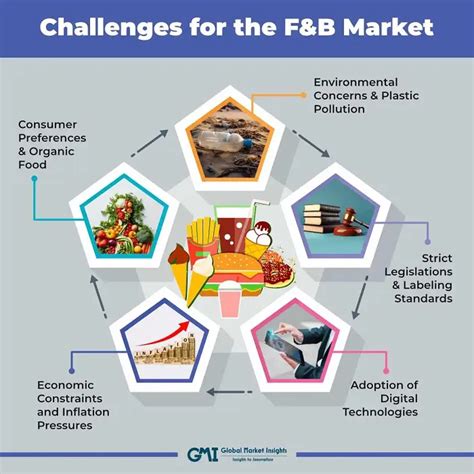Challenges in the Food and Beverage Industry: Navigating a Complex Landscape
The food and beverage (F&B) industry is a dynamic and ever-evolving sector, facing a multitude of challenges that require innovative solutions and strategic adaptation. From fluctuating raw material costs to evolving consumer preferences and stringent regulations, navigating this landscape demands a keen understanding of the current market dynamics. This article delves into some of the key challenges impacting the F&B industry today.
Supply Chain Disruptions and Volatility
One of the most significant hurdles facing F&B companies is the unpredictability of the global supply chain. Geopolitical instability, climate change, and unforeseen events like pandemics can severely disrupt the flow of raw materials and ingredients, leading to:
- Increased costs: Fluctuations in availability directly impact pricing, making it difficult to maintain consistent profit margins.
- Shortages: A lack of crucial ingredients can halt production and negatively affect customer satisfaction.
- Logistical nightmares: Delays and disruptions in transportation further exacerbate the problem.
Effective strategies to mitigate these issues include diversifying sourcing, building stronger relationships with suppliers, and implementing robust inventory management systems. Investing in supply chain technology and predictive analytics can also help anticipate and respond to potential disruptions.
Changing Consumer Preferences and Demands
Consumer preferences are constantly evolving, driven by factors like health consciousness, ethical sourcing, and sustainability concerns. This means F&B businesses must:
- Adapt to health trends: The increasing demand for healthier options necessitates reformulating products to reduce sugar, salt, and fat content while enhancing nutritional value.
- Embrace sustainable practices: Consumers are increasingly aware of the environmental impact of food production and are demanding more sustainable and ethically sourced products. This includes reducing waste, minimizing carbon footprint, and promoting fair trade practices.
- Cater to diverse dietary needs: Meeting the demands of various dietary restrictions, such as vegan, vegetarian, gluten-free, and allergen-free options, is crucial for inclusivity and market expansion.
Intense Competition and Market Saturation
The F&B industry is highly competitive, with new players constantly entering the market. This saturation leads to:
- Price wars: Companies often resort to aggressive pricing strategies to gain market share, potentially squeezing profit margins.
- Increased marketing costs: Standing out in a crowded marketplace requires significant investment in marketing and branding to attract and retain customers.
- Innovation pressure: Companies must constantly innovate and develop new products to stay ahead of the competition and meet evolving consumer demands.
Rising Labor Costs and Skill Shortages
The F&B industry relies heavily on human capital, but rising labor costs and a shortage of skilled workers pose significant challenges. This necessitates:
- Investing in employee training and development: Upskilling the workforce is vital to enhance productivity and retain valuable employees.
- Exploring automation: Automating certain processes can help mitigate labor shortages and improve efficiency.
- Offering competitive compensation and benefits: Attracting and retaining talent requires offering competitive salaries and benefits packages.
Regulatory Compliance and Food Safety
Stringent regulations and food safety standards are crucial for maintaining consumer trust and preventing outbreaks. Compliance requires:
- Investing in robust quality control systems: Implementing rigorous quality control measures throughout the production process is vital for ensuring food safety.
- Staying updated on changing regulations: Keeping abreast of evolving regulations is critical to avoid penalties and maintain compliance.
- Investing in food safety training: Equipping employees with the necessary knowledge and skills to handle food safely is essential.
Conclusion
The challenges facing the food and beverage industry are multifaceted and require proactive strategies to overcome. By understanding these challenges and adapting to the changing market dynamics, F&B businesses can navigate this complex landscape and achieve sustainable growth. Continuous innovation, robust supply chain management, a focus on consumer preferences, and a commitment to ethical and sustainable practices are key to success in this dynamic industry.
